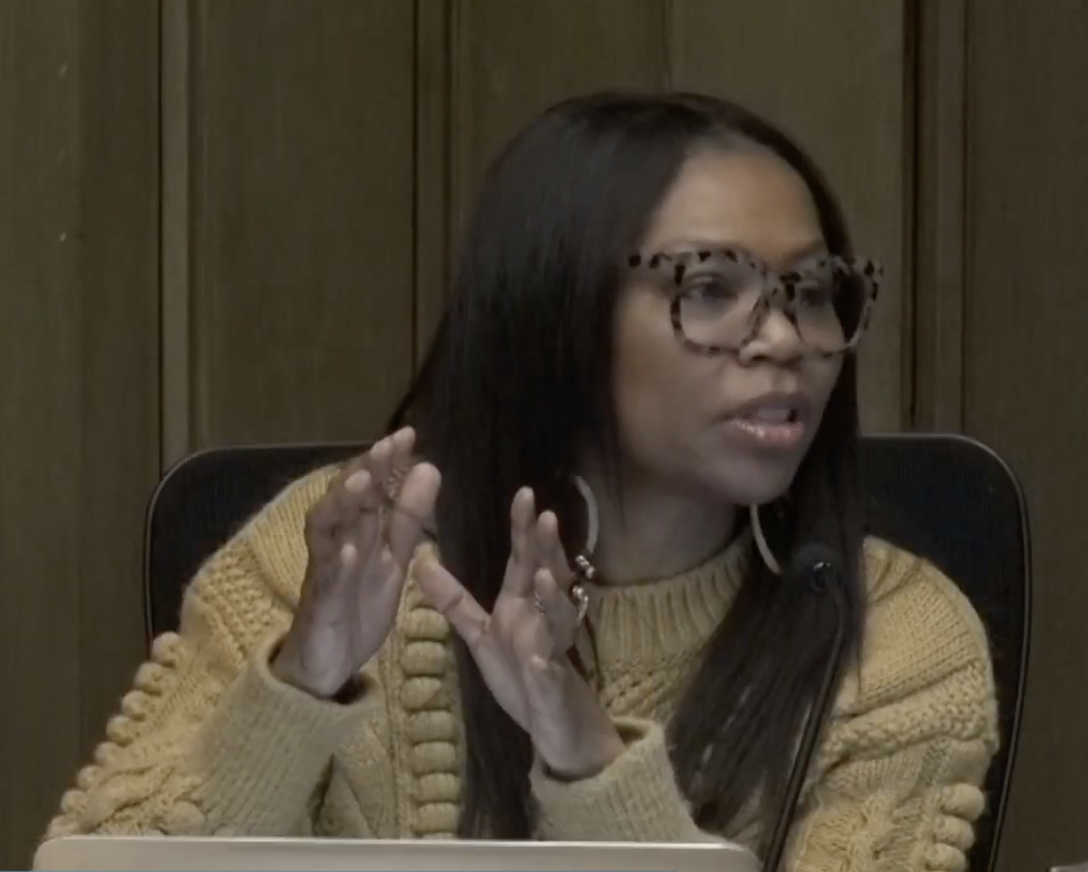Tension was high at the Feb. 13 Asheville City Council meeting as Council members decided the fate of a plan to install a 24-hour, prefabricated restroom unit outside the Rankin Avenue parking garage. After a somewhat fervent discussion among Council members, the board approved the project, 5-1, with Antanette Mosley opposed.
As previously reported by Xpress, the restroom will be a Portland Loo, a 7-by-10-foot single-stall structure that will provide enough room for a wheelchair, bike or stroller. Capital Projects Director Jade Dundas said the facilities are built to be more resistant to vandalism and easier to clean. The bathroom’s blue interior lighting also makes it difficult for intravenous drug users to find a vein for injection. Additionally, there will be routine after-hours checks by the city’s new parking garage security contractor, Walden Security.
The council approved $183,620 for site enhancements and installation with a contingency amount of $46,724, as well as $170,760 for the restroom itself. The total is $401,104. The restroom will be funded with $650,000 in American Rescue Plan Act dollars, allocated for the project in May 2022.
The vote, initially scheduled for Council’s Jan. 23 meeting, was delayed after several members asked to explore other downtown bathroom options — specifically reopening restrooms at 29 Haywood St. that were closed in 2020. City officials cited increased maintenance costs, drug use and vandalism as causes for its permanent closure.
Cost projections presented to the Council found that upfront expenses were higher for the prefabricated Portland Loo than reopening the Haywood facility, but long-term costs were significantly lower.
“Overall, in a five-year time frame, the costs associated with reopening 29 Haywood St. is significantly higher than the Portland Loo,” said Dundas. “With 24/7 security, the cost would be almost double.”
Dundas noted that adding the prefabricated unit does not prevent reopening the 29 Haywood St. restrooms or installing other free-standing restrooms. He said the city is in early talks with the Asheville Downtown Association, whose offices are near the Haywood Street facilities, to reopen and maintain those bathrooms for daytime usage.
“The expectation would be that the bathrooms would only be open during daytime, weekday hours, when the [Asheville Downtown Association] is open,” Dundas said. “In that scenario, with no additional security and daytime use only, the total first-year costs for reopening 29 Haywood St. are estimated to be $21,500.”
ARPA priorities
The Portland Loo discussion expanded to include a conversation about ARPA funds for PEAK Academy, which requested $590,000 in October to help keep the school open through the rest of the school year. City Manager Debra Campbell said PEAK submitted a written request, but a formal application is still needed to meet federal guidelines for ARPA funds.
Several community members expressed concern that funding the restroom would prevent the Council from being able to support PEAK. Council members stated that the two projects would be considered separately.
“There is a false narrative that this is either/or,” said Council member Kim Roney. “We need funding for public bathrooms and for PEAK Academy. I hope that PEAK provides a path to [do so] and applies for ARPA and/or strategic partnership funds, and I intend to support it.”
Council member Antanette Mosley, the sole opposing vote, said that Council should make clear its support for PEAK funding so that community members don’t continue to think the two projects are competing for funding.
“I got a call from a member of the community saying that we care more about where people take a s*** than we do about Black children,” Mosley said. “I don’t want to leave that impression with the community.”
“How can we as a city even consider the kind of spend on a single toilet for the houseless folks here in Asheville, among others, when Asheville’s education achievement gap is the worst in North Carolina?” asked resident Kimberly Collins during public comment. “PEAK Academy, a school that is actually closing that gap, has made a request. … I am asking that instead of dying on this mountain of a [$650,000] single toilet, that you do consider the request from PEAK in the fullness of the amount that they have asked for.”
While Council briefly discussed delaying the bathroom vote again, Dundas said the city would be forced to rebid for the project, resulting in higher costs and potentially eating further into remaining ARPA funds.
Mayor Esther Manheimer said more conversations around ARPA funding would come at a later date and PEAK was invited to make a formal application. With the approval of the bathroom, about $1 million in ARPA money is left to be allocated.




